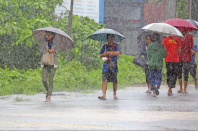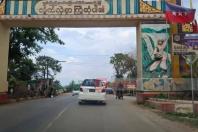The Treaty of Yandabo was an agreement signed by representatives of the British government and the Myanmar monarchy to end the Anglo-Myanmar War of 1824 that broke out during the reign of King Bagyidaw.
This conflict began on March 5, 1824, starting with the Assam-Manipur uprising, leading to Myanmar military defeats. By 1826, British forces, advancing by land and sea, reached about six miles as far as Yandabo village, located about 40 miles south of the Myanmar royal city of Ava. The treaty was signed on February 24, 1826, with Myanmar ceding Arakan, Taninthayi, and Assam to the British. Additionally, Myanmar agreed to stop intervening in Manipur, Kachin, and Jaintia territories, and to pay one crore of war reparations in installments. These 11-clause treaty significantly diminished Myanmar’s sovereignty.
At present, under the name of "1027 Operation Second Wave," the MNDAA, TNLA, and allied groups have launched attacks and taken control of Lashio, where the North-East Command Headquarters is located, as well as Kyaukme, Nawngkhio, and Mogok.
Under the Shanman Campaign, TNLA and PDFs are conducting operations in Mogok, Madaya, Singu, and Moemeik within Mandalay Region. On July 3, MNDAA and allied forces started attacking Lashio, the strategic base of the northern Shan State. These clashes have reached Madaya, about 20 miles from Mandalay, and Singu, about 40 miles away, threatening the nation's economic hub, Mandalay.
The 1027 operations and ongoing conflicts in northeastern Myanmar differ significantly from other skirmishes. According to AA's statements, plans for operations like 1027 have been in the works since the previous NLD government's tenure about five years ago.
Additionally, it has been observed that the conflicts across the country are interconnected along China's Belt and Road Initiative (BRI) and pipeline projects, passing through regions and Myanmar, along China's route to the Indian Ocean outlet.
There are also analyses suggesting that the weapons used in all the operations of the Northern Alliance, as well as the sources of their weapons, are likely to be directly or indirectly obtained from China and supplied through “Wa”, which has at least six arms factories.
The 1027 Operation, the northern Shan battles, and the widespread ongoing conflicts, whether labeled as revolutions, ethnic issues, federal issues, or otherwise, should be analyzed as 21st-century proxy colonial wars that resemble the pattern of 19th-century colonial invasion wars.
Therefore, China's Haijin talks will likely resemble the Treaty of Yandabo, which paved the way for Myanmar to lose its independence and sovereignty during the First Anglo-Myanmar War.
China's so-called peace talks resemble the Treaty of Yandabo of 1826 by the British, using military and political pressure in a similar manner. Given the current battles and pressures from all sides, it is not wrong to say that Myanmar is facing a situation where its sovereignty and independence are at risk.
Therefore, in order to prevent the loss of the nation's independence and sovereignty, two main actions must be implemented: returning unwaveringly to a democratic system and establishing a genuine federal union that meets the aspirations of the ethnic groups.
If the country cannot swiftly transition to democracy, it will be far from establishing a federal union system, and it may face worrisome situations regarding its independence and sovereignty. Myanmar's sovereignty is at risk of being easily lost, and if that happens, rebuilding it will be extremely difficult. This should be noted with caution.
In order to preserve Myanmar's independence, maintain its sovereignty, and ensure the stability of the Union, it is necessary to recognize that these goals are far more important than the interests of any individual, organization (Tatmadaw), party, or the value of a single constitution. This principle should be emphasized not only by the State Administration Council (SAC) but also by all opposition forces.
Therefore, it is necessary for Myanmar to swiftly return to a democratic system and to establish a federal union system that meets the aspirations of the ethnic groups. The Daily Eleven urges that the government, opposition, and all relevant parties engage in extensive meetings and discussions to achieve this.











